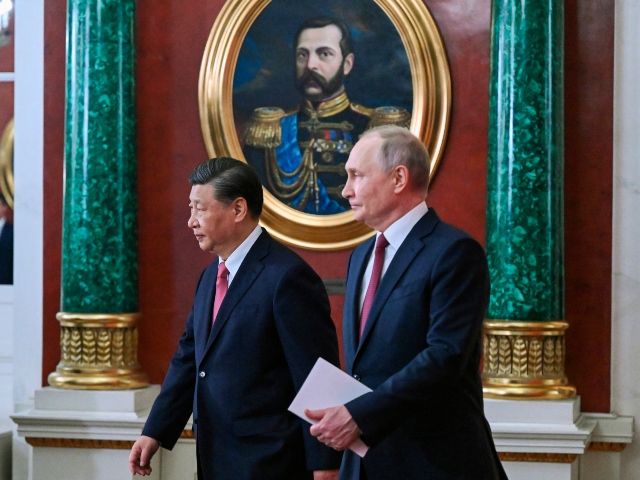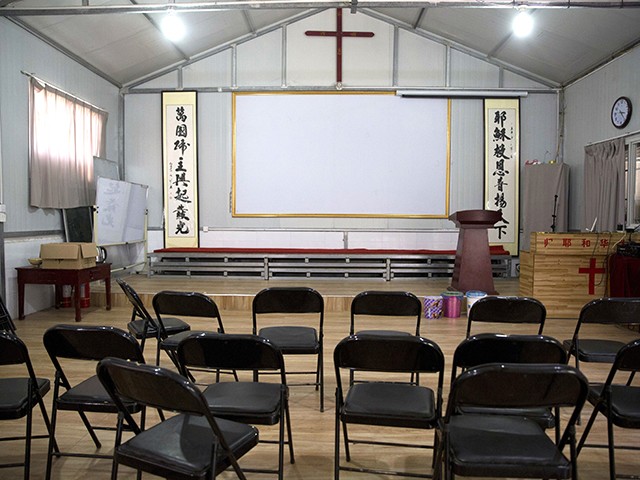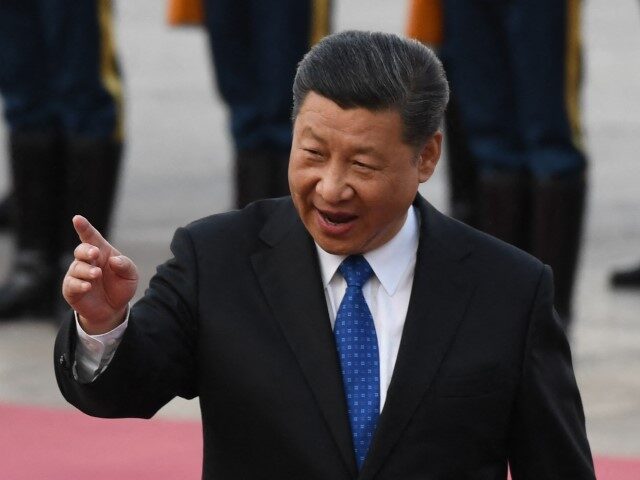China’s state propaganda outlet Global Times proclaimed 2023 the “most depressing Christmas Eve in the West since the end of the Cold War” on Tuesday, claiming that a failure to support the Communist Party’s foreign policy demands had made the holiday “insecure.”
The state newspaper, which acts as a mouthpiece for the regime of dictator Xi Jinping, listed several international conflicts made worse by the influence of the Chinese government as the reason for the alleged malaise in the season, prominently including the Russian invasion of Ukraine – which China did not oppose – and the “Israeli-Palestinian conflict,” by which the Times meant the war between Israel and the genocidal terrorist organization Hamas. Beijing has steadfastly supported Hamas’s interests and demanded the international community place “constraints” on Israel’s ability to protect its civilians in the aftermath of the October 7 atrocities.
While the Chinese outlet lamented the alleged state of Christmas in the West, the Communist Party at home violently represses the practice of Christianity, regularly persecuting Christians who pray outside of the communist-captured “legal” churches and banning children from attending church or practicing any religion. Religious fervor can harm a Chinese citizen’s “social credit score,” which the regime uses to curtail the liberties of those deemed insufficiently loyal to the Communist Party.
“For the Western world, this year’s Christmas Eve was indeed full of trouble,” the Global Times nonetheless lamented, “the tumultuous atmosphere brought about by the Russia-Ukraine conflict, the Israeli-Palestinian conflict, and domestic political and social divisions, ‘dulls and threatens to suffocate the joy of Christmas.'”
“It would not be an exaggeration to say that this was the most depressing Christmas Eve in the West since the end of the Cold War,” the propaganda outlet melodramatically concluded.
Absent from the Global Times‘s analysis of the allegedly unenjoyable Christmas season is China’s role in exacerbating the conflicts listed. On the issue of the Russian invasion of Ukraine, which began as attacks in western regions in 2014 but escalated into a full-scale invasion in 2022, China has remained one of Russia’s top allies through the war – even while maintaining diplomatic and economic ties to Ukraine – and criticized Kyiv for its relations with the United States.
“Since Kiev is deeply influenced by Washington, which is not interested in an immediate ceasefire but prefers a prolonged conflict to keep undermining Moscow and change the status quo by force, it is really hard to see a feasible formula for peace that both sides can accept,” the Global Times complained in February.
Dictator Xi Jinping visited Russia in March as a show of solidarity with Russia’s efforts to topple the democratically elected government of President Volodymyr Zelensky, claiming he wanted to express “friendship, cooperation, and peace” alongside the invading state.

Russian President Vladimir Putin, right, and Chinese President Xi Jinping arrive to attend a signing ceremony following their talks at The Grand Kremlin Palace, in Moscow, Russia, Tuesday, March 21, 2023. (Grigory Sysoyev, Sputnik, Kremlin Pool Photo via AP)
The Global Times did not clarify how the Russian invasion of Ukraine was affecting Christmas festivities in the Americas or much of Western Europe – outside, of course, of the effect the war has directly on Ukrainian refugees and the affected regions. The negative effects of the Hamas threat to Israel in the West were far clearer this year, as pro-Hamas riots erupted in multiple American and European cities during Christmas. In America, pro-Hamas rioters disrupted Christmas festivities in San Francisco and New York. Multiple European cities were also forced to use heightened security measures to protect churches in light of potential Islamist attacks.
Pro-Palestinian protesters climb, toss ornaments off Union Square tree. It remains dark, potentially broken as @SFPD investigates @KPIXtv pic.twitter.com/NEGsjDK67m
— Betty Yu (@bett_yu) December 24, 2023
🚨#BREAKING: NYPD Calls for Level Three Mobilization Amidst Numerous Fights Between Pro-Palestine Protesters and Police at a Large Protest⁰
📌#Manhattan l #NewYorkCurrently, the New York Police Department has requested a Level Three mobilization for a large protest that is… pic.twitter.com/j2ZAUvERF3
— R A W S A L E R T S (@rawsalerts) December 25, 2023
China has vocally supported Hamas’s position since the October 7 terrorist slaughter, which resulted in 1,200 deaths, 250 abductions, and a wave of gang rape, torture, murder of children, and other crimes against humanity by Hamas terrorists in Israel. The Communist Party hosted a pro-Hamas Arab summit in November to condemn Israel for engaging in limited military operations to neutralize the threat of future Hamas attacks and has used its platform at the United Nations to demand “concrete constraints” on Israel’s national security actions.
WATCH: Monument to Children Held Hostage by Hamas
Joel B. Pollak / Breitbart NewsThe Global Times nonetheless proceeded to blame “the West” generally for its alleged woes.
“But if you look at the headlines of the US and Western media on Monday, people feel that ‘Christmas Eve is not safe,’ and the due festiveness and peace of the holiday were pushed to the edge of various conflicts and chaos,” the Global Times claimed. “It is regrettable that although Western public opinion lamented the world’s insecurity, they could hardly dive into any deep reflection on the reasons why Christmas Eve is no longer peaceful.”
Among the litany of reasons listed for why Christmas Eve was allegedly the worst in decades, the Global Times blamed NATO for having “refused to fade away” and individual countries pursuing their own sovereign security without regard for the interests of Beijing.

In this photo taken Monday, June 4, 2018, Chinese calligraphy which reads “All nations belong to the Lord arising to shine” at left and “Jesus’s salvation spreads to the whole world” at right are displayed below a crucifix in a house church shut down by authorities near the city of Nanyang in central China’s Henan province. Under President Xi Jinping, China’s most powerful leader since Mao Zedong, believers are seeing their freedoms shrink dramatically even as the country undergoes a religious revival. Experts and activists say that as he consolidates his power, Xi is waging the most severe systematic suppression of Christianity in the country since religious freedom was written into the Chinese constitution in 1982. (Ng Han Guan/AP)
“The difference lies in the type of ‘security’ we seek – whether it is a universally shared security or a comparative security where ‘you must be worse off than me.’ The diverse starting points often lead to vastly different outcomes,” the Global Times argued.
“This form of fragmented security, created through military aggression, forming alliances, inciting conflicts, and shifting blame, undermines the common security of the entire world,” the state newspaper claimed. “The narrow and one-sided pursuit of so-called group security by the US and the West, inevitably results in insecurity for other nations.”
The article concluded with a pitch to the world to join China’s “Global Security Initiative,” a vague plan proposed by genocidal Chinese dictator Xi Jinping for nations to stop pursuing their own national security and instead embrace a poorly defined collectivist approach with China’s interests at the forefront.
“China proposed the Global Security Initiative this year, urging the world to follow a path of pursuing common security,” the Global Times recalled. “On this Christmas Eve that is not so silent, we hope it can lead to more reflection in the West and prompt greater participation from various sides, including Western and US societies, in building a path toward common security.”
Xi personally announced the “Global Security Initiative” in April 2022, with little explanation as to what it actually is outside of the philosophy of abandoning the concept of national security.
“It has been proven time and again that the Cold War mentality would only wreck the global peace framework, that hegemonism and power politics would only endanger world peace,” Xinhua quoted Xi as saying at the time, “and that bloc confrontation would only exacerbate security challenges in the 21st century. To promote security for all in the world, China would like to propose a Global Security Initiative.”
“In today’s world, unilateralism and excessive pursuit of self-interest are doomed to fail; so are the practices of decoupling, supply disruption and maximum pressure,” he continued. “So are the attempts to forge ‘small circles’ or to stoke conflict and confrontation along ideological lines.”
China has yet to offer any clearly defined explanation as to what the “Global Security Initiative” is.

COMMENTS
Please let us know if you're having issues with commenting.